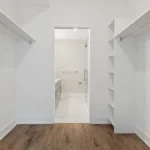- A closet dream represents a sub-compartment of the mind where memories, experiences, and emotions are stored away.
- The objects found in a closet dream, such as the clothes or type of closet, have symbolic significance and reflect different aspects of the dreamer’s psyche and emotional state.
- Closet dreams can provide insights into hidden aspects of the self, the need for personal growth, and the reflection of fear and shame.
- The interpretation of a closet dream can vary depending on cultural and religious beliefs, but common themes include hidden secrets and shame, self-image and identity, personal transformation, and spiritual journeys.
Closet dreams are often highly symbolic, reflecting different aspects of the dreamer’s psyche. In a dream, the closet represents a sub-compartment of the mind, storing away memories, experiences, and emotions..
Significance of Objects in a Closet Dream

1. Understanding the Role of Clothing in Closet Dreams
The clothes found in a closet often represent the dreamer’s identity or self-image. Clothes are a symbol of confidence, sexuality, and self-worth, or unconscious feelings of low self-worth. A closet full of clothes may suggest that the dreamer is hiding something that needs to be exposed. On the other hand, an empty or clean closet may indicate that past issues have been resolved.
2. Interpreting Various Objects Found in a Closet
Dreams like to use metaphors or idiomatic expressions, and this is evident in the objects found in a closet dream. Some of the objects and their meanings include:
| Object | Meaning |
|---|---|
| Haunted Closet | Reflects hidden emotions and past trauma |
| Wardrobe | Represents memories, feelings, and emotions |
| Messy Closet | Symbolizes chaos and confusion |
| Big Closet | Suggests adaptability and readiness for any situation |
| Collapsed Closet | Indicates hopeless hopes and resentment |
| Locked Closet | Points to the dreamer’s inability to express feelings |
| Buying a Closet | May indicate a change in the dreamer’s financial situation |
The type of closet may also have symbolic significance. For example, a linen closet may be linked to feelings of comfort and protection, whereas a janitorial closet could relate to the need for a mental cleanup.
3. Exploring Hidden Aspects of the Self
A closet dream may indicate that the dreamer is hiding an aspect of themselves from others or from themselves. The level of fear or shame associated with this hidden aspect can be reflected in the objects found in the closet. The interpretation of a closet dream should focus on what the dreamer is hiding or not wanting to face.
4. Making Space for New Growth
The items in a closet are often categorized as frequently used, stored for later use, or forgotten objects still being held onto. As such, a closet dream can suggest that the dreamer needs to discard old thoughts, emotions, or ways of being to make room for new growth.
Common Dream Scenarios Involving Closets

Dreaming of a Clean vs. Messy Closet
- Symbolizes the state of your mind and emotions
- A clean closet indicates clarity, organization, and a sense of peace
- Reflects a proactive attitude towards self-improvement
- An indication that you have sorted through past issues and are ready for new growth
- A messy closet represents chaos and confusion in your life
- Encourages you to declutter your mind and address unresolved issues
- Suggests a need for introspection and a thorough examination of your emotions and thoughts
- Take action to clean and organize your mental space for greater clarity and peace
Dreaming of Being Locked in or Hiding in a Closet
- Signifies feelings of being trapped or stifled in your waking life
- Indicates a fear of expressing yourself or revealing your true feelings
- Reflects a need to address hidden emotions or secrets
- Encourages you to confront and overcome fears of judgment or rejection
- Signals a desire for freedom and authenticity
- Take steps to open up, express yourself, and seek support in your journey
Dreaming of a Haunted or Collapsed Closet
- Suggests unresolved emotional disturbances or past traumas
- May indicate buried memories, guilt, or hurt that need to be acknowledged and healed
- Reflects a need to confront and release negative emotions and experiences
- Encourages seeking professional help or support to navigate through difficult emotions
- Take time to process and heal from past wounds for personal growth and emotional well-being
Dreaming of a Walk-in Closet
- Signifies seclusion or hiding from the outside world
- Reflects a desire for privacy or time for introspection
- Symbolizes a need for self-care and self-reflection
- Encourages setting boundaries and prioritizing self-nurturing activities
- Take time for yourself, reflect on your needs, and establish healthy boundaries
Dreaming of a Full or Empty Closet
- A full closet may indicate a sense of overwhelm or a need for decluttering
- Suggests an accumulation of unresolved issues or unprocessed emotions
- Encourages addressing and resolving emotional baggage
- An empty closet represents a clean slate and a fresh start
- Symbolizes growth, change, and the opportunity to create a new chapter in your life
- Take action to clear emotional clutter and create space for personal growth and transformation
Dreaming of Changing Clothes in a Closet
- Reflects a desire for personal transformation and self-reinvention
- Suggests a need to explore new aspects of yourself or different roles in your life
- Encourages embracing change and embracing different facets of your personality
- Symbolizes the ability to adapt to various situations and find new ways of self-expression
- Take the opportunity to explore different aspects of your identity and embrace personal growth
Psychosocial and Emotional Analysis of Closet Dreams

Closet dreams can offer valuable insights into our emotional and psychological well-being. These dreams often relate to hidden aspects of ourselves and can provide a window into our fears, shame, self-identity, and more. Let’s delve deeper into the psychosocial and emotional analysis of closet dreams.
1. Common Emotional and Psychological Themes in Closet Dreams
Closet dreams often reflect common emotional and psychological themes that many people experience. These themes include:
- Fear and Anxiety
Dreaming of a closet can symbolize fear and anxiety that we may be hiding or avoiding in our waking lives. It may indicate that we are afraid to confront certain situations or emotions. - Shame and Guilt
Closet dreams can also be a reflection of shame and guilt that we carry within ourselves. The hidden nature of a closet may represent feelings of embarrassment or the desire to keep certain aspects of ourselves hidden. - Desire for Privacy
Closets can symbolize a need for privacy and solitude. Dreaming of a closet may indicate a longing for a safe space where we can retreat from the demands and pressures of the outside world. - Self-Identity and Image
The clothes we find in a dream closet can represent our self-identity and the image we present to the world. A messy or disorganized closet may indicate feelings of confusion or a lack of clarity about who we are. On the other hand, a clean and organized closet may symbolize a strong sense of self and a clear understanding of our identity.
2. Reflection of Fear and Shame in Closet Dreams
One of the most significant psychological aspects of closet dreams is the reflection of fear and shame. Closets often represent hidden parts of ourselves that we may feel ashamed or afraid to acknowledge. These dreams can bring to light the fears and anxieties that we keep hidden from others and even ourselves.
Dreaming of a haunted or cluttered closet may indicate unresolved emotional issues or past traumas that we are afraid to confront. It is essential to remember that facing these fears and shame head-on can lead to personal growth and healing.
3. Closet Dreams as a Reflection of Self-Identity and Image
Closet dreams can also provide insights into our self-identity and the image we present to the world. The clothes we find in our dream closets symbolize the masks we wear in our daily lives and the persona we project to others.
Finding ourselves in a dream closet full of clothes can represent a strong sense of self-identity and a desire to express our authentic selves to the world. On the other hand, discovering a closet full of hidden or neglected clothes may suggest that we are suppressing certain aspects of ourselves or not fully embracing our true identity.
Dreaming of changing clothes in a closet can indicate a desire for self-transformation or the need to adapt to new situations. It may be a sign that we are ready to let go of old ways of being and embrace a new version of ourselves.
4. Tips for Exploring Closet Dreams
Exploring and analyzing closet dreams can provide valuable insights into our emotional and psychological well-being. Here are some tips to help you delve deeper into the meaning of your closet dreams:
- Keep a dream journal
Write down your closet dreams as soon as you wake up to capture the details and emotions you experienced. This will help you identify patterns and recurring themes. - Reflect on your emotions
Pay attention to the emotions you felt during the dream and upon waking. What fears, anxieties, or shame did the dream evoke? Reflecting on these emotions can provide valuable insights into areas of your life that may need attention. - Consider personal associations
Think about what closets represent to you personally. Do they evoke feelings of safety and comfort, or do they trigger feelings of confinement and restriction? Understanding your personal associations with closets can offer further insights into the meaning of your dreams. - Seek support if needed
If your closet dreams consistently evoke intense emotions or psychological distress, consider seeking support from a therapist or counselor. They can help you explore and process the underlying emotions and experiences that may be driving these dreams.
Cultural and Religious Interpretations of Closet Dreams

Influence of Culture and Religion on Dream Interpretation
Dream interpretation is deeply rooted in cultural and religious beliefs. Different cultures have unique perspectives on dreams and attach specific meanings to dream symbols. Similarly, religious teachings often shape how individuals interpret their dreams.
Cross-Cultural Significance of Dream Symbols in Closets
The symbolism of closets in dreams can vary across cultures and depend on the individual’s personal experiences and beliefs. However, some common themes can be observed in various cultural interpretations:
- Hidden Secrets and Shame
In many cultures, closets represent hidden aspects of ourselves, secrets, or shameful experiences that we may be hiding from others or even ourselves. Dreams about closets can disclose repressed emotions, past traumas, or unresolved issues. - Self-Image and Identity
Clothes found in a closet often symbolize the image we present to others and our self-perception. Different cultures may interpret these symbols differently. For example, in some cultures, clothing can represent social status or adherence to religious customs. - Personal Transformation
Dreams featuring closets can also indicate a need for personal growth and change. Cleaning out or organizing a closet can represent the process of letting go of old beliefs, behaviors, or habits and making room for new experiences and personal transformation. - Spiritual Journeys
Some cultures interpret closets in dreams as portals to the spiritual realm or as a representation of inner exploration. The hidden treasures or skeletons found in a dream closet may symbolize spiritual revelations or the need to confront spiritual truths.
Case Studies: Cultural Perspectives on Closet Dreams
Let’s take a deeper look at how different cultures interpret dreams about closets:
- Ancient Egyptian Culture
For the ancient Egyptians, dreams were significant and believed to contain messages from the divine. They viewed closets as places that held hidden prophecies or personal revelations. The contents of the closet in a dream were considered symbolic of what needed to be addressed or resolved in the dreamer’s life. - Australian Aboriginal Culture
Aboriginal cultures saw dreams as a means of connecting to the creation of the world. Dreams about closets were interpreted as glimpses into the ongoing process of creation. Instead of giving specific interpretations, Aboriginal cultures embraced dreams as personal experiences that were unique to each individual. - Greco-Roman Culture
In Greco-Roman cultures, dreams were seen as messages from the gods. Closets in dreams were associated with hidden aspects of one’s life or emotions. The condition of the closet, such as whether it was organized or messy, could indicate the state of the dreamer’s psyche or the need for personal reflection and introspection. - Islamic Culture
In Islamic culture, dreams were considered a form of communication with Allah. Dreams about closets were categorized into three types: true dreams from Allah, dreams originating from the dreamer’s own thoughts and anxieties, and malicious dreams initiated by the Shaytan (the devil).
Closet dreams offer a unique opportunity to explore the depths of one’s subconscious and gain a better understanding of their innermost feelings and desires. By examining the objects found in the dream and reflecting on their symbolic significance, individuals can begin to unravel the hidden messages that their psyche is trying to communicate. Whether these messages relate to fear and shame, identity and self-image, personal growth, or spiritual evolution, exploring closet dreams can be a powerful tool for personal insight and growth. Remember to approach these dreams with compassion and without judgment, allowing yourself the space and time to explore these hidden parts of your psyche with curiosity and care.










Leave a Reply